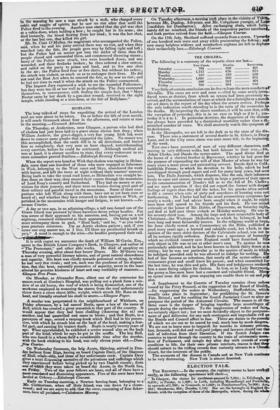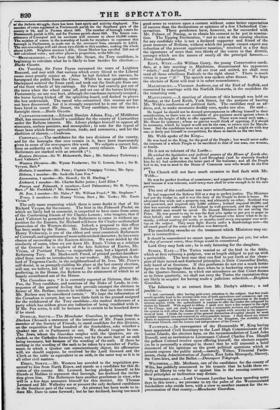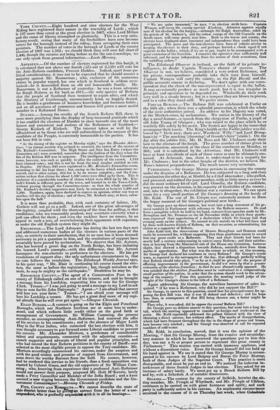ELECTION TALK.
THE REGISTRY.—In the country, the registry seems to have wortait-\, easily„aathe.followieg specimens will show—) I 'In Glasgow, the claims far-ensolmentamouralo 7,024; in Edinburgh, lor ; -6,678; in Paisley, to 1,260; in Leith, including Musselburgh and Portobellisp ; / to upwards of1,700; in Greenock, to 1,039; in Dumbartonshire, to 900; Ayr. 255; Strathavon, 304; Dundee, 1,743. Nor are the boroughs in England *.- fithent, with the exception of those of the Metropolis, where, during the whole ssi the Reform struggle, there has been least Spirit and activity displayed. The 1 Illimber of votes registered in Portsmouth parish for the Southern part of the i county is 94, and in Poi tsea about GOO. The number of borough voters for Portsmouth parish is 374, and for Portsea parish about 850. The future con- (about 4,500. Brighton musters 1,475 ; Great Marlow has enrolled 350 out of ,....400 calculated votes; and other places in proportion, as the bills say. sti, u tuena cy of Liverpool and its environs will amount to about 10,000 voters. The number of voters in the township of Leeds for members to represent this borough in Parliament, as made out in the overseers lists, amounts to 2,614. The out-townships will add about two-thirds to this number, making the whole DFORDSHIRE.—We bear that Mr. Stuart, the Tory candidate, is beginning to calculate what he is likely to lose besides his election.— Bucks Gazette.
On Tuesday, Sir Peter Payne canvassed the town of Leighton Buzzard, and met with that success which every friend to the Liberal
cause must greatly rejoice. at. After he had finished his canvass, he harangued the public from the Cross. Whilst he was speaking, some blackguard entered the Swan yard; and took out the limb-pin from one of the front wheels of his carriage. Sir Peter had scarcely got out of the town when the wheel came off, and set one of the horses kicking. Fortunately, no one was hurt, although the coachman narrowly escaped ;
the horse having kicked off the splashing-board, and dashed to pieces the box underneath. The rascal who committed this wanton act has not been discovered ; but it is strongly suspected he is one of the fel- lows hired to escort Mr. Stuart, the Tory candidate, into the town a fortnight since.—Bucks Gazette.
. CARMARTHENSHIRI.—Edward Hatnlyn Adams, Esq., of Middleton Hall, has announced himself a candidate for the county of Carmarthen _under the Reform interest. Mr. Adams pledges himself to oppose all sinecures, useless pensions, and monopolies ; to vote for the repeal of those laws which fetter agriculture, trade, and commerce ; and for the _abolition of slavery.—Cambrian. - • CORNWALL.—The candidates for the two divisions of the county, and for the boroughs that now remain in it, have been inaccurately
given in some of the newspapers this week. We subjoin a correct list, from an authority on which we, can place every reliance. The Anti- Reformers are marked with an asterisk (+).
Eastern Division—Sir W. Molesworth, Bart. ; Mr. Salusbury Trelawney ; Lord Valletort.* Western Division—Mr. Wynne Pendarves; Sir C. Lemon, Bare.; Sir R. Vyvyan, Bait.° Bodmin, 2 members—Mr. Peter ; Captain Crespigny Vivian ; Mr. Spry. Miami, 1 member—Mr. Sackville Lane Fox.* Launceston, 1 member—Mr. Howell; Sir H. Harding.* Liskeard, 1 member—Mr. Charles Buller junior ; Lord Eliot.* .Penryn and Falmouth, 2 members—Lord Palmerston; Sir R. Vyvyan, Bart. ;* Mr. Freshfield ;* Mr. Stewart.* St. Ives, 1 member—Mr. Hulse ;* Mr. William Praed ;° Mr. Stephens.* • Truro, 2 members—Sir Hussey Vivian, Bart.; Mr. Tooke; Mr. Ennis Vivian.• The only name respecting which there is some doubt is that of Sir Richard Vyvyan, for the county. The hint in the Falmouth Packet, on
which we lately had to comment, is suspeeted to have Come from some of the Conforming friends of Sir Charles Lemon ; who imagine, that if Lord Valletort be permitted by the Reformers to come in without op- position for the Eastern, Sir ,Richard will leave Sir Charles undisturbed possession of the Western division. Indeed, a proposal to this effect has been made by the Tories. Mr. Salusbury .'frelawney, son of Sir Henry Trelawney, is one of the oldest and most consistent Reformers , of Cornwall, and a gentleman of most unblemished character; he has every • chance of succeeding in the Eastern division. We were misled by the similarity of name, when we put down Mr. Ennis Vivian as a relation of the General : he is nephew of the late Solicitor of Excise, Mr.
Vivian, of Portland Place,—a respectable man, but a bigoted Anti- Reforming Tory. Mr. Mackworth Praed, of printed pocket-handker-
chief fame, needs no introduction to our readers. Mr. Stephens is the lord of Trernna Castle, in the neighbourhood of St. Ives. Mr. Peter's self-denial, in so promptly yielding his place at the last county election,
will not, we believe, fail of its reward : he will have .the pleasure of perfecting, in the House, the Reform to the attainment of which he so largely contributed out of the House. will not, we believe, fail of its reward : he will have .the pleasure of perfecting, in the House, the Reform to the attainment of which he so largely contributed out of the House.
- The Cornubian says, "It is currently reported at Helston, that Mr. Fox, the Tory candidate, and nominee of the• Duke of Leeds, in con- sequence of the general feeling that prevails amongst the electors in favour of Mr. Borlase, intends to withdraw : in that case the return of 'Mr. Borlase may be considered certain." We hope the information of the Cornubian is correct, but we have little faith in the ground assigned
for the withdrawal of the Tory candidate—the modest deference of a party which has seldom given any indication of being troubled with it. If Mr. Fox retire, it will be because he is certain to be knocked down if he stand.
. DURHAM, SOUTH.—The Manchester Guardian, in quoting from the Durham Chronicle a statement of the intention of Mr. Pease junior, a member of the Society of Friends, to stand candidate for this division, on the- requisition of four hundred of the freeholders, asks whether a - Quaker can sit in Parliament or not. We should imagine he can.
• The Jews, whom the Guardian couples with the Quakers, are ex- cluded, as the totholics formerly were, not by the mere fact of an oath being-necessary, but because of the wording of the oath. If there be nothing in the wording of the oath to be taken by a member of Parlia- ment, to which a Quaker can conscientiously object, his affirmation will, we should suppose, be received by the Lord Steward and the Clerk at the table as equivalent to an oath, in the same way as it is in all other civil matters.
ESVX, NORTH.—Mr. Western has acceded to the requisition pre- sented to him from North Essex, and stands as a candidate for this di- vision-of \tbe county. Mr. Lennard, having pledged himself to his friends at Maldon to represent that borough, has declined the invita- tion given him. The Reformers have another gentleman in view, who will in a few days announce himself for this district. Sir Thomas Lenuard and Mr. Wellesley are at present the only declared candidates in the Southern part of the county. An attempt has been made to in- duce Mr. Dare to come forward; but he has declined, having too much good sense to venture upon a contest without some better expectation of success than the declarations or opinions of a few Chelmsford Con- servatives. These gentlemen have, however, so far succeeded with Mr. Palmer, of Nasing, as to obtain his consent to be put in nomina- tion. The Epping Declaration, "not to vote at the ensuing election for any candidate who is not a declared supporter and friend of the great measure of Reform, without which the people cannot expect any reduction of the present oppressive taxation," received in a few days the signatures of more than two thirds of the voters in that district, amongst which are the names of nearly all the principal farmers.— Essex Independent.
KENT, WEST.—Sir William Geary, the young Conservative candi- date, at a late meeting in Maidstone, denominated his opponents "rebels ;" and declared, "if all are true and united, we shall soon send all these rebellious Radicals to the right about." There is much virtue in your "if." The speech was spoken after dinner. We hope the electors of Kent will bear it in sober remembrance.
MALMESBURY.—Viscount Andover, son of the Earl of Suffolk, and connected by marriage with the Norfolk Howards, is the candidate fbr the remaining seat.
MARYLEBONE.—A meeting of electors of this borough was held on Monday, at the Lord Keith, York Street, for the purpose of hearing Mr. Webb's confession of political faith. The candidate read an ad-- dress, and, to make assurance doubly sure, spoke one also. He said— He hoped he should not be deemed presumptuous in offering himself to their consideration' as there was no candidate of pre-eminent merit against whom.it would be the height of folly to offer opposition. There were many such men,— Mr. Hume for instance; whom no patriot would think of opposing, if it should be necessary, which he hoped would not be the case, to return ii1111 for Maryle- bone. But the candidates were not so pee-eminent; and he might sit with any one, or fairly put himself in competition, for them to decide on the two best.
Mr. Webb spoke of the King
He was loyal to the King, for the good of the People but would never suffer the interests of a whole People to be sacrificed to that Of one man, one woman,, or family.
He is not so tolerant of the Lords— He wished the legislative and judicial powers of the House of Lords abo- lished ; and was glad to see that Lord Brougham (and he sincerely thanked him for it) had undertaken the latter part of the business; and all the People bad to do, was to send to the House of Commons men who would do the first part.
The Church will not have much occasion to find fault with Mr. Webb— He was for perfect freedom of conscience; and supported the Church of Eng- land because it was tolerant, until every man shall be wise enough to be his own parson.
The rest of the confession was more miscellaneous— He had supported the Reform Bill as a step to perfect justice. The Ministers had put the wedge in, and it was the duty of the People to drive it home. He advocated free trade and a property-tax, and ultimately no other. Scotland was well governed, and required only 2,000 soldiers; Ireland required 30,000, and that was scarcely sufficient. Let Ireland be well governed, and the expense of that 30,000 men would be saved. He blamed Ministers tor not saving the Poles. He was proud to say he was the ficst who spoke or put pen to paper in their behalf; and men ought to be in Parliament who knew what to do in- stantly, without waiting for weeks, or months, until every newspaper was writ- :ay on the subject. They must fight Russia under a disadvantage now—the advanced guard of the army of freedom was destroyed.
The concluding remarks on the treatment which Ministers may ex--- pect is instructive— It should be remembered we cannot spare the Ministers just yet; but when the day of account comes, these things would be remembered.
Lord Grey may look out; he is only fattening for the slaughter.
Sussex, EAST.—The Tories remind us of the bird in the fable, which at first refusing a gudgeon, was at length obliged to put up with a periwinkle. The best man they can find to put forth as the cham- pion of their tarred-and-feathered principles, is little Counsellor Darby, only heard of at Sessions. If this gentleman do not cut a much better figure on the hustinigs than he does when he is hackering away at a case at the Quarter-Sessions, to which our attendance on that Court dooms its to listen quarterly, we shall not envy the Tories the reputation they are likely to acquire for having made a Judicious selection.—Brighton Guardian.
The following is an extract from Mr. Darby's address ; a sad jumble !—
" I feel convinced, after having paid every attention to the subject, that free trade would speedily lead to the irretrievable ruin of both agriculture and, commerce, aud am therefore opposed to it in every form : nor can I conceive any protection to the landed interest unjust, while the agriculturist is anxious to offer the trader the safeguard he claims for himself. With regard to tithes, I shall ever have a due respect Mille right of the Clew, and am ready to support such a reasonable revision and settlement of the system as will allow the farmer to invest his capital with security in the improie- ment of land. I think the causes of the general diminution of capital should be most carefully inquired into and removed by every possible means. I shall direct my utmost efforts to maintain unimpaired the Constitution of the Kingdom, the stability of the Protestant Church, and the honour and independence of the Crown."
TAVISTOCK.—In consequence of the Honourable W. King baying been appointed Civil Secretary to the Lord High Commissioner of the Ionian Islands, the electors have, on the recommendation of Lord John Russell, sent an invitation to Lieutenant- Colonel Charles Fox. Should the gallant Colonel resolve upon 'offering himself, the electors require (as be is personally a stranger to them)• that he will transmit a brief statement of his opinions on the great political questions which at present engross the public mind,—namely, Tithes, Triennial Parlia- ments, cheap Administration of Justice, East India Monopoly, Slavery, the Corn-laws, and the Ballot.—Devonport Telegraph.
WILTSIHRE.—Mr. Methuen, one of the candidates for the county of Wilts, has publicly announced to his tenants that he holds them en- tirely at liberty to vote for or against him in the ensuing contest, as their principles or inclination may dictate.
WESTMORELAND.—Lord Viscount Lowther has been spending sonic days in this town ; we presume to try the pulse of the WeStmorelinid freeholders who reside here, with a view to another contest for the re- presentation of that county.—Manchester Guardian. YORK COUNTY.—Eight hundred and nine electors for • the West Riding have registered their names in the township of Leeds 7 - which is 137 more than voted at the great election in 1807, when Lord Milton and the cause of liberty triumphed so gloriously. This is a very satis- factory result, seeing that many of the freeholders have now become voters for the borough instead of the riding, from occupying their own premises. The number of votes in the borough of Leeds at the county election of 1807 was 1,162; we should think they will now fall short of 1,400, though the returns not being before us for the out-townships, we can only speak from general information—Leeds Mercury.




























 Previous page
Previous page